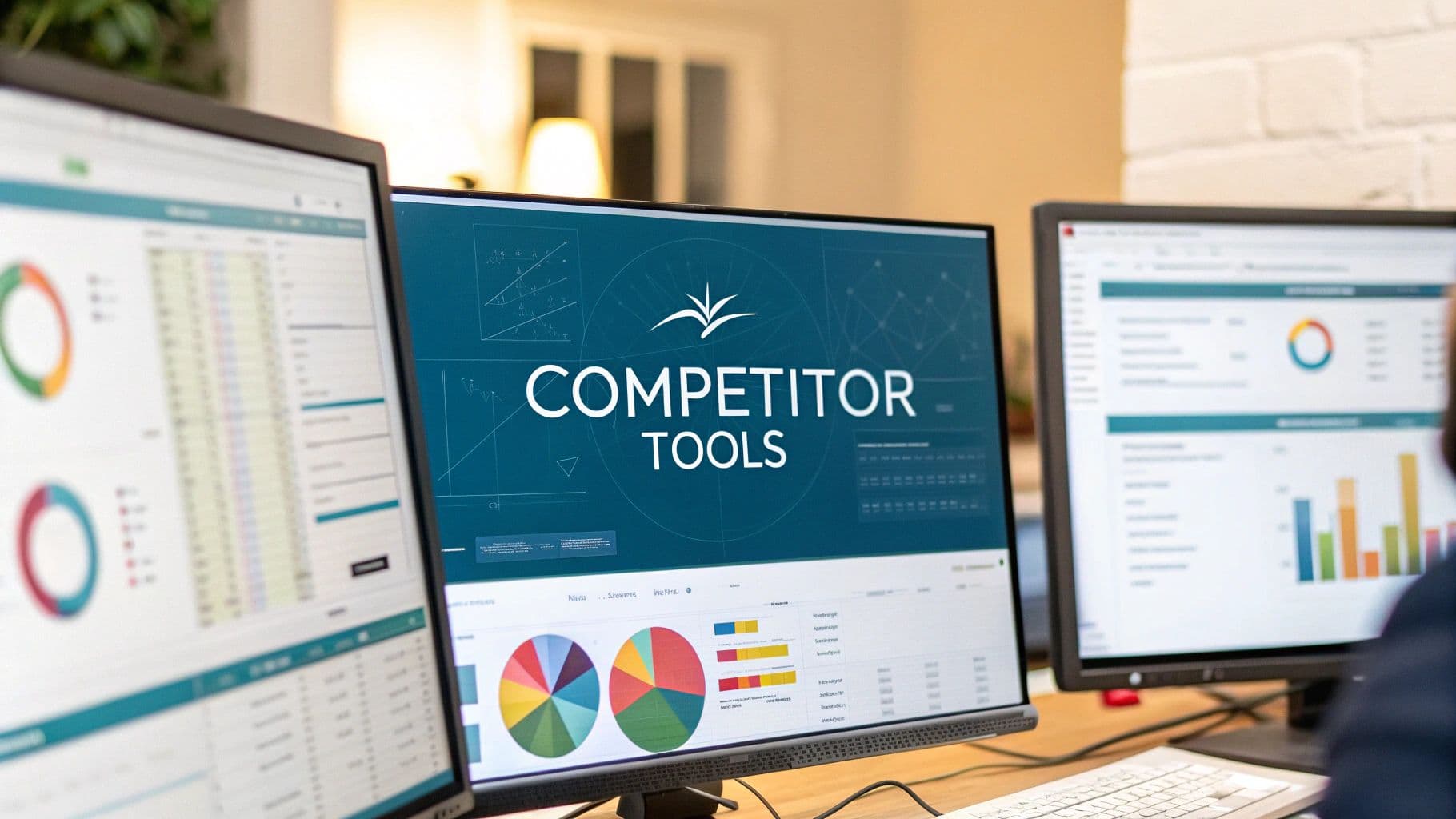
Knowing your competitors is table stakes. Systematically decoding their strategy to find your edge is how you win. Without the right tools, you're just guessing, burning cash and missing opportunities. This guide cuts the fluff. It’s our internal list of the best competitor analysis tools that fuel our growth strategy at BillyBuzz.
Forget generic feature lists. This is a founder-to-founder playbook on how we actually use these platforms. I'm sharing the exact workflows, alert rules, and filters we use to monitor rivals, find SEO gaps, and track what customers are really saying. This is the stack that informs our decisions, from product tweaks to marketing spend.
Each tool here has a breakdown of its core strengths, where it shines, where it falls short, and what it costs. Screenshots and direct links are included. Whether you're a bootstrapped founder, a marketer, or a product lead, you'll find a solution you can use today. While this article focuses on direct competitor analysis, the broader discipline of competitive intelligence is also crucial. For a deeper look into that ecosystem, you can explore a comprehensive list of the best competitive intelligence tools.
This isn't theory. It's our operational playbook. Let's get into the tools we use to stop guessing and start winning.
1. BillyBuzz
Full disclosure, this is our tool. We built BillyBuzz because we needed a way to turn Reddit into a customer acquisition channel, not just a time sink. It's an AI-driven monitoring tool that finds high-intent conversations about your competitors and your niche in real-time. It's one of the best competitor analysis tools for intercepting prospects right when they're asking for recommendations.
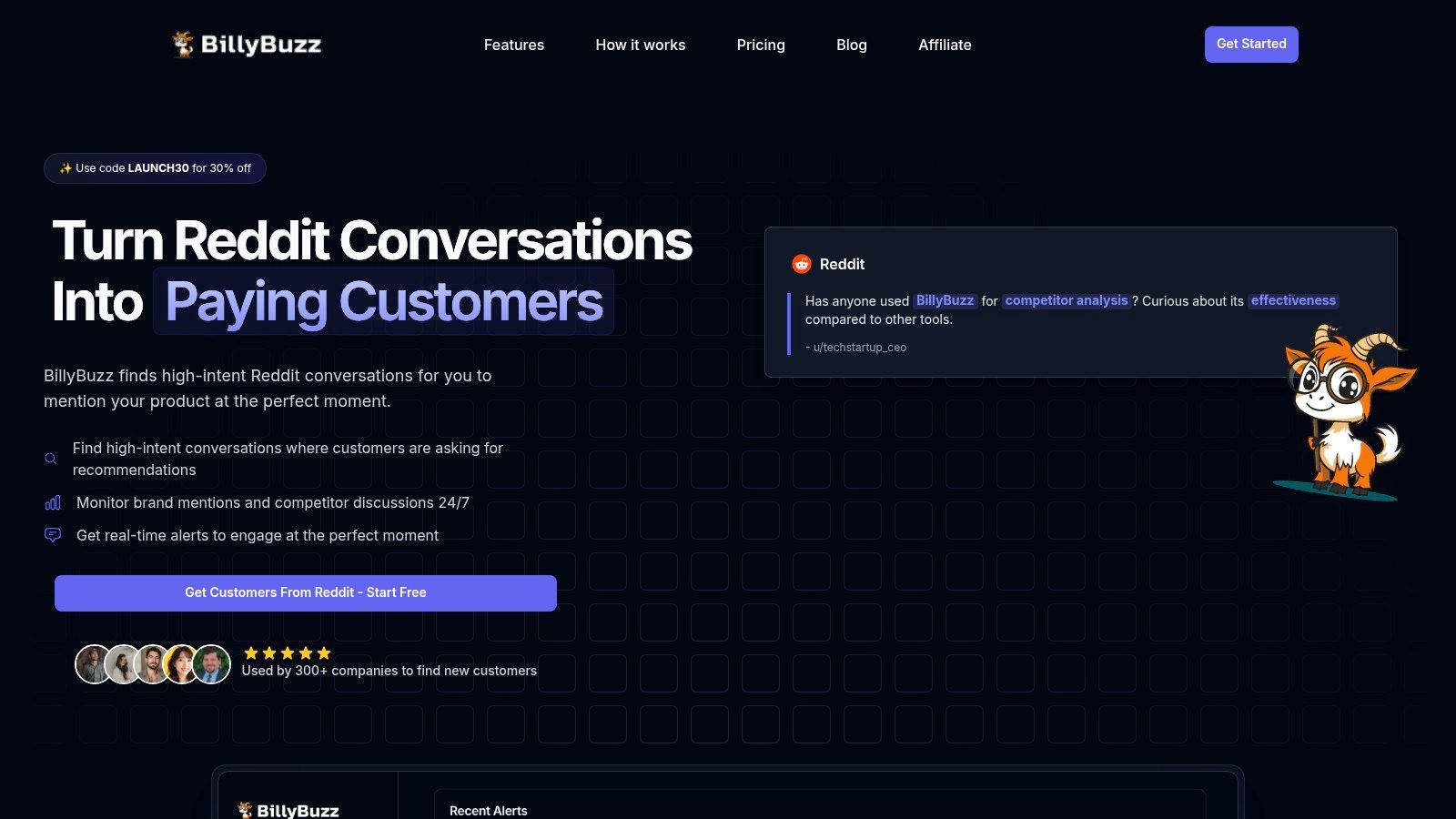
Its core strength is context-aware AI. Instead of just flagging keywords, it analyzes sentiment and intent. You get alerts in Slack when someone posts "I'm frustrated with [Competitor X], any alternatives?" or "Looking for a tool that can do Y." This lets you jump in and be genuinely helpful, not spammy.
Key Features & How We Use It
- AI-Powered Relevancy Scoring: The system prioritizes mentions that signal high purchase intent, filtering out noise. This is the magic—it saves us hours of manual searching.
- Direct Competitor Monitoring: We set up projects to track mentions of key competitors in specific subreddits. For example, we monitor
r/SaaSfor any posts comparing us to other monitoring tools. - High-Intent Keyword Tracking: We track problem-based keywords like "best alternative to [competitor name]" or "how to track competitor mentions." This finds users who need us but don't know we exist yet.
- AI Reply Suggestions: For common questions, we use the AI to generate a draft reply. We always tweak it to be personal, but it's a huge time-saver. A typical template starts with: "Hey [Name], saw you were looking for an alternative to [Competitor]. A few people in this sub have found our tool, [Our Tool], helpful because of [Specific Feature that solves their problem]. Happy to answer any questions if you have them."
Our Internal Playbook: Inside BillyBuzz, we have an alert rule for the phrase
"alternative to [Competitor A]" OR "[Competitor B] vs [Competitor C]"filtered to ther/marketing,r/saas, andr/growmybusinesssubreddits. These alerts go directly to our #customer-intel Slack channel, giving us a daily stream of high-intent leads.
Best For: Founders, indie hackers, and marketing teams who want to use Reddit for leads, brand building, and competitive intel without wasting all day on it.
| Pros | Cons |
|---|---|
| AI relevancy scoring surfaces high-intent leads, not just keyword mentions. | Focus is exclusively on Reddit; requires other tools for wider social media coverage. |
| Real-time alerts via Slack, Discord, and Email enable rapid engagement. | Advanced features and higher project limits are reserved for premium plans. |
| We’ve seen users get their first customers within a week of signing up. | |
| Scalable pricing makes it accessible for solo founders and growing teams alike. |
Pricing: Starts with a Starter plan at $15/month (billed annually) for solo founders. A 30-day money-back guarantee is offered because we stand behind it.
2. Semrush
Semrush is the Swiss Army knife of digital marketing. If you need to dissect a competitor's online strategy, especially their search and ad game, it's one of the best competitor analysis tools you can buy. It gives you a panoramic view of their online footprint, from organic keywords to paid ad copy.
Where Semrush really delivers is its granular data, particularly for US markets. At BillyBuzz, we live in the Keyword Gap tool. We plug in our domain and three of our top competitors, then filter for keywords where they rank but we don't. We specifically look for keywords with "transactional" or "commercial" intent and a difficulty score under 40. This is our content strategy goldmine.
Core Features & How We Use It
- Traffic Analytics: Get a quick estimate of a competitor's traffic and where it comes from.
- Organic Research: See the exact keywords a competitor ranks for.
- Advertising Research: Analyze their ad budgets and see the actual ad copy they're running.
- Backlink Gap: Compare your backlink profile against up to four competitors to find easy link-building wins.
Our Take: The interface can feel like a cockpit at first, but the data is unmatched. For us, it replaces 2-3 other tools, which justifies the cost. If you're serious about SEO, you need something this powerful. Get a head start with our guide to competitor analysis for emerging businesses.
Pricing
| Plan | Price (Monthly) | Best For |
|---|---|---|
| Pro | $129.95 | Freelancers and startups with limited needs |
| Guru | $249.95 | SMEs and growing marketing agencies |
| Business | $499.95 | Agencies, e-commerce projects, and businesses |
- Pros: Extremely comprehensive toolkit, robust data for major markets, powerful integrations.
- Cons: Steep learning curve, can become expensive with add-ons and additional users.
Website: https://www.semrush.com
3. Ahrefs
Ahrefs is a beast for SEO, famous for its backlink data. If you need to reverse-engineer a competitor's off-page SEO and content strategy, it's one of the best competitor analysis tools, period. Its strength is the sheer volume and quality of its link index.
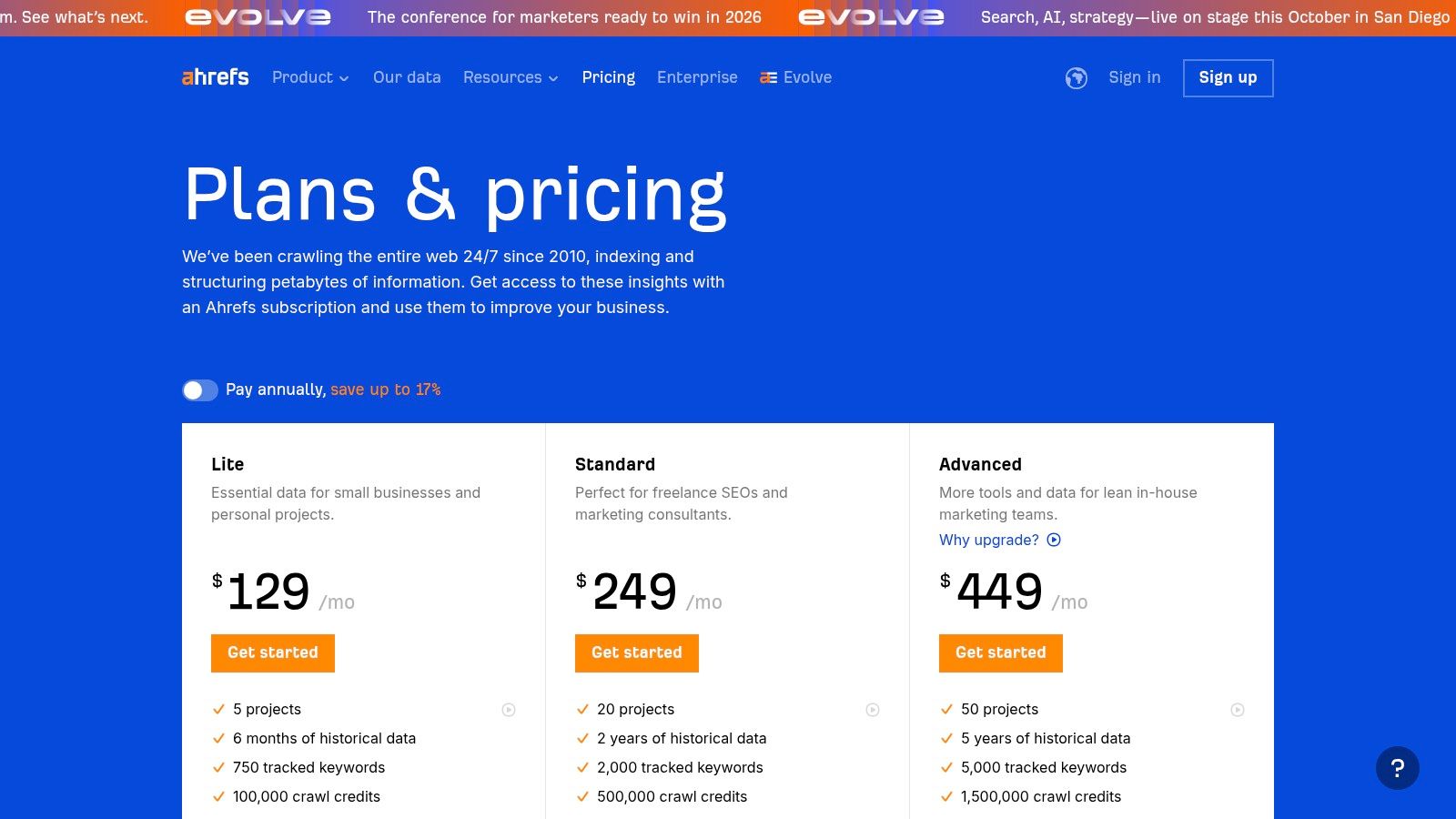
What sets Ahrefs apart is the workflow. At BillyBuzz, we use the Content Gap feature in Site Explorer to find keywords multiple competitors rank for, but we don't. Then we pivot to Keywords Explorer to analyze the SERP history. This process from discovery to content planning is incredibly efficient and helps us build topic clusters that actually rank.
Core Features & How We Use It
- Site Explorer: Get a complete overview of any competitor’s backlink profile, organic keywords, and paid search campaigns.
- Keywords Explorer: Generate keyword ideas, analyze their ranking difficulty, and see their traffic potential.
- Content Explorer: Discover the most popular content in any niche by shares, traffic, and referring domains.
- Rank Tracker: Monitor your keyword rankings and benchmark them against competitors.
Our Take: Ahrefs has the most intuitive UI for deep-diving into backlink and content data. For pure-play SEO and link-building research, its data is top-notch. The credit-based system means you have to be more deliberate, but it's worth it. For an even deeper dive, see how modern platforms are evolving in our guide to AI tools for competitor analysis.
Pricing
| Plan | Price (Monthly) | Best For |
|---|---|---|
| Lite | $99 | Solopreneurs and small business owners |
| Standard | $199 | SEO professionals and in-house marketers |
| Advanced | $399 | Growing teams and agencies |
- Pros: Excellent data quality for backlinks and keywords, powerful and intuitive research workflow.
- Cons: The seat/credits model can become pricey for larger teams, some features are locked behind higher tiers.
Website: https://ahrefs.com/pricing?utm_source=openai
4. Similarweb
Similarweb gives you the 30,000-foot view of the competitive landscape. While other tools get into the weeds of SEO, Similarweb excels at benchmarking market share, traffic trends, and channel performance. It’s one of the best competitor analysis tools for big-picture strategy.
We use Similarweb's Traffic & Engagement metrics before diving into a deep keyword analysis. It helps us quickly see if a competitor relies on organic search, direct traffic, or social. This top-down view stops us from wasting time on a deep SEO teardown of a competitor who gets 90% of their traffic from paid ads.
Core Features & How We Use It
- Website Traffic Analysis: See where any website’s traffic comes from—direct, referral, search, social, and display ads.
- Audience Insights: Understand a competitor’s audience demographics and interests.
- Keyword & Ads Intelligence: Analyze a competitor’s paid and organic keywords.
- Market Research: Identify emerging market leaders and benchmark your performance.
Our Take: Similarweb is our go-to for market sizing. It’s less about finding specific keywords and more about answering strategic questions like, "Which channels are our competitors winning in?" It provides the strategic context for our tactical efforts.
Pricing
| Plan | Price (Monthly) | Best For |
|---|---|---|
| Starter | $125 | Individuals and small businesses |
| Professional | $333 | Mid-sized businesses and agencies |
| Team/Enterprise | Custom | Large organizations and market research teams |
- Pros: Strong top-of-funnel and channel visibility, excellent for benchmarking market share and trends, intuitive interface.
- Cons: Granular data and longer historical views require expensive higher-tier plans, pricing scales quickly with features.
Website: https://www.similarweb.com/packages/marketing/?utm_source=openai
5. SpyFu
SpyFu is a laser-focused tool for dissecting PPC and SEO strategies. It’s one of the best competitor analysis tools for paid search managers and SEOs who want to get straight to the point. Its mission is to expose the profitable ad and search formulas of your competitors.
Its real strength is its historical data. At BillyBuzz, we use the PPC Ad History feature to see how our competitors' ad copy has changed over the years. This tells us their most consistent messaging, which is a huge clue to what converts best for our shared audience. It's a goldmine for writing ad copy that works on day one.
Core Features & How We Use It
- PPC Competitor Research: See every keyword competitors have bid on, every ad test they've run, and their estimated ad spend.
- SEO Competitor Research: Uncover a competitor's organic keyword rankings and inbound links.
- Keyword Research Tools: Find profitable keywords based on competitor data.
- Unlimited Searches & Exports: A huge plus on Pro plans for deep data collection.
Our Take: SpyFu offers incredible value for its price, especially if you're heavy on PPC. Its backlink data isn't as good as Ahrefs, but the sheer volume of accessible PPC data provides a massive ROI. You can complement its insights by learning how to monitor competitors' social media tactics.
Pricing
| Plan | Price (Monthly) | Best For |
|---|---|---|
| Basic | $39 | Small businesses and solopreneurs |
| Pro | $79 | Most SMEs and marketing teams needing unlimited data |
| Team | $299 | Agencies and larger teams requiring API access |
- Pros: Outstanding value with unlimited data on Pro plans, straightforward interface for PPC research, deep historical ad data.
- Cons: Interface and visualizations are less modern, smaller link database compared to top-tier SEO suites.
Website: https://www.spyfu.com/mainpurchase/?utm_source=openai
6. Moz Pro
Moz Pro is a veteran in the SEO space, great for SMBs. Its strength is its accessibility and its proprietary metrics like Domain Authority (DA), which provide a quick way to compare your SEO strength against a competitor's. It’s an excellent starting point if you're new to this.
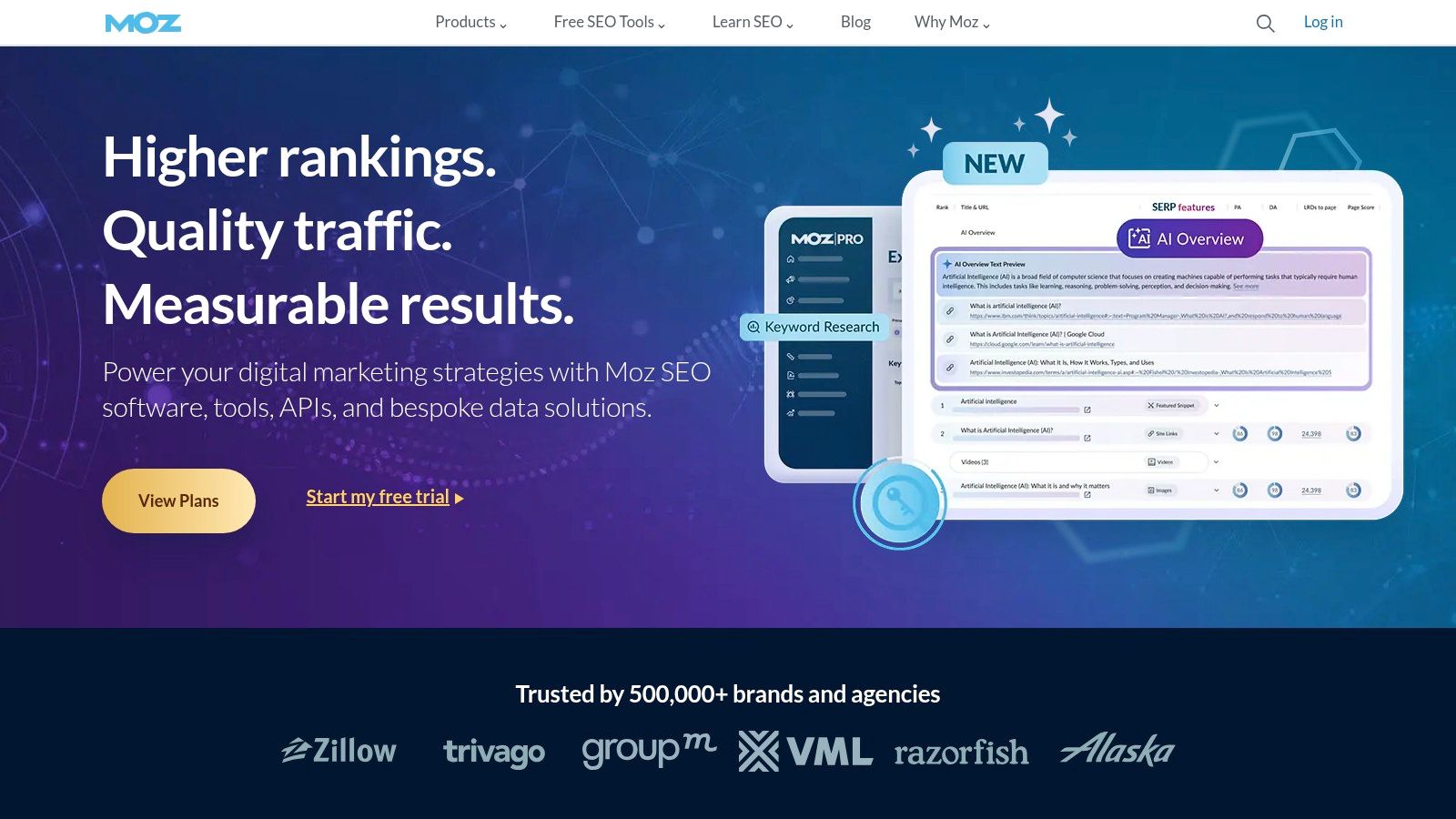
At BillyBuzz, we use the Link Explorer to quickly benchmark our Domain Authority against our closest competitors. This helps us set realistic quarterly goals for link building and understand the effort required to close the authority gap. This makes it one of the best competitor analysis tools for foundational SEO strategy.
Core Features & How We Use It
- Campaigns: Track your site's performance against a few key competitors.
- Keyword Explorer: Discover competitor keywords and identify opportunities.
- Link Explorer: Analyze competitor backlink profiles and compare domain authority.
- Site Crawl: Run on-demand crawls of competitor sites to find technical SEO issues.
Our Take: Moz Pro is a welcoming platform if other SEO suites feel intimidating. While its data may not be as deep as some rivals, its clarity and trusted metrics make it a powerful asset for growing businesses.
Pricing
| Plan | Price (Monthly) | Best For |
|---|---|---|
| Standard | $99 | Startups and small businesses |
| Medium | $179 | Growing businesses and smaller agencies |
| Large | $299 | Larger agencies and in-house marketing teams |
| Premium | $599 | Large agencies and enterprise businesses |
- Pros: Accessible user interface and excellent educational resources, trusted DA/PA metrics for quick benchmarking.
- Cons: Data depth and update frequency can lag behind top-tier competitors, seat limits are restrictive on lower plans.
Website: https://www.moz.com
7. BuzzSumo
BuzzSumo is about content resonance. It tells you which topics are getting social shares, media mentions, and backlinks for your competitors. For content marketing and PR, it’s one of the best competitor analysis tools for figuring out what captures audience attention.
We use the Content Analyzer to research a competitor's domain and filter their content by "Total Engagement" over the last six months. This shows us their home-run articles, giving us a blueprint for topics and formats that work in our niche. It’s critical for de-risking our content calendar.
Core Features & How We Use It
- Content Discovery: Find the most shared content for any topic, keyword, or competitor.
- Monitoring & Alerts: Set up real-time alerts for brand mentions or competitor content.
- Backlink Analysis: See which sites are linking to your competitors' top content.
- Influencer Research: Identify key authors and journalists sharing content in your industry.
Our Take: BuzzSumo is a specialist tool. It's not a replacement for an all-in-one SEO suite, but a powerful complement. It provides the "why" behind content performance.
Pricing
| Plan | Price (Monthly) | Best For |
|---|---|---|
| Content Creation | $199 | Small teams and content creators |
| PR & Comms | $299 | PR agencies and communications professionals |
| Suite | $499 | Larger teams needing full-funnel content insights |
| Enterprise | $999 | Large organizations with complex data needs |
- Pros: Excellent for benchmarking content resonance, strong PR and journalist outreach workflows, intuitive interface.
- Cons: Not a full SEO suite, pricing has increased and is geared more towards larger teams.
Website: https://buzzsumo.com
8. Crayon
Crayon is a dedicated competitive intelligence platform that goes beyond basic SEO. It tracks everything from website changes and messaging shifts to new product reviews and pricing updates. It’s one of the best competitor analysis tools for getting the whole company, especially sales and product, on the same page.
We use Crayon's alert system to monitor competitors' help center articles and developer docs. This gives our product team a real-time feed of subtle feature changes we might otherwise miss, allowing us to stay ahead of market shifts.
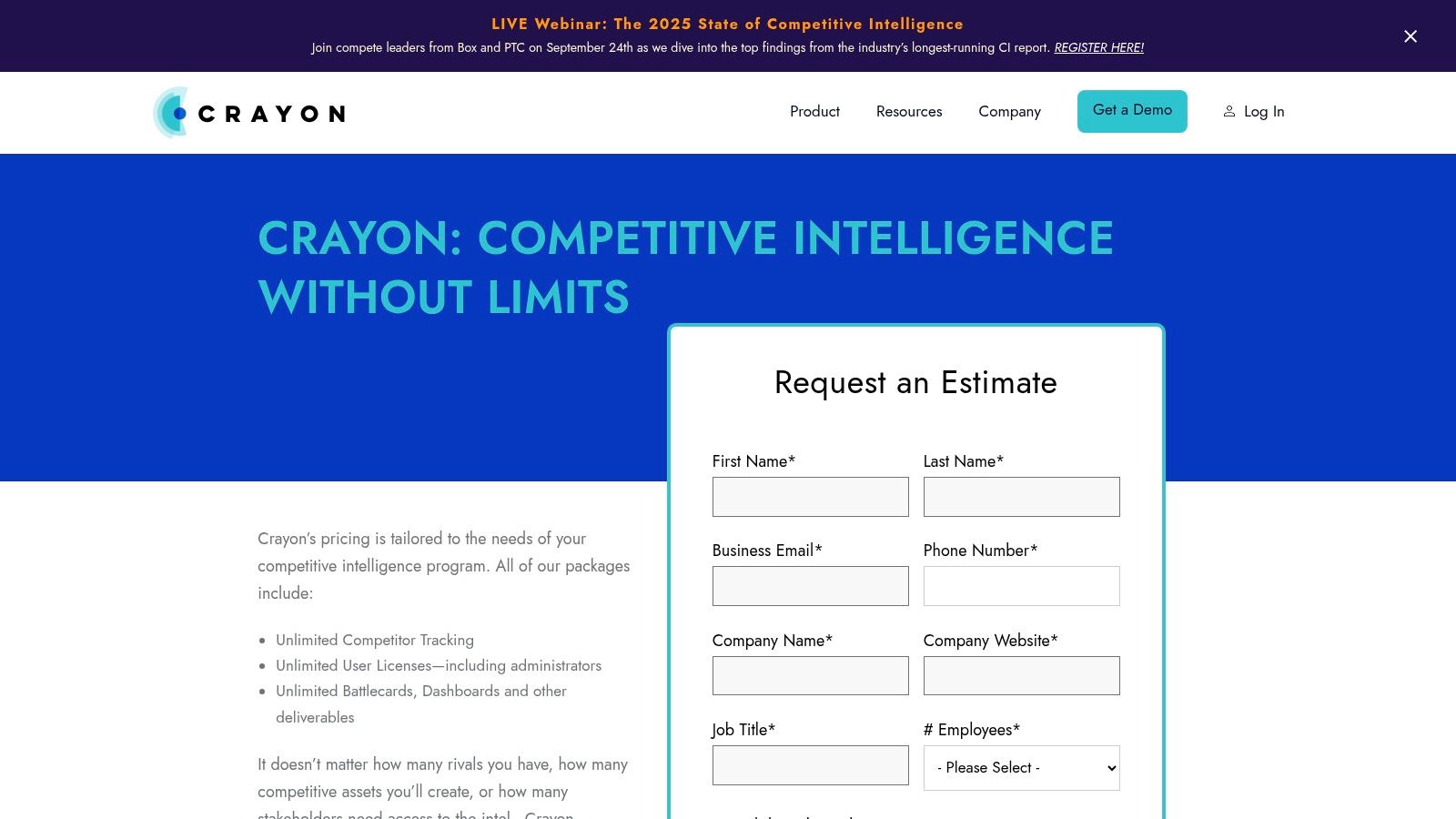
Core Features & How We Use It
- Unlimited Competitor Tracking: Monitor websites, social media, review sites, and news outlets.
- Battlecards & Dashboards: Create and distribute dynamic sales battlecards to help sales teams win deals.
- Automated Alerts & Reports: Set up custom alerts for specific competitor actions.
- Intelligence Program Workflows: Centralize external data and internal intel from your team.
Our Take: Crayon is built for scaling competitive intelligence beyond the marketing team. It requires commitment to set up, but arming sales, product, and leadership with timely intel provides a significant strategic advantage.
Pricing
| Plan | Price (Monthly) | Best For |
|---|---|---|
| Custom | Varies | Mid-market to enterprise-level businesses |
| Custom | Varies | Companies needing to scale a formal CI program |
| Custom | Varies | Sales, product, and marketing orgs |
- Pros: Scalable for enterprise-wide intelligence programs, strong emphasis on sales enablement and team collaboration.
- Cons: No public pricing requires sales engagement, significant implementation overhead to integrate internal intel.
Website: https://www.crayon.co/pricing-inquiry?utm_source=openai
9. Kompyte
Kompyte (now part of Semrush) focuses on turning competitive analysis into sales enablement. It automatically tracks competitor movements—website changes, product updates, social media—and distills it into actionable insights, alerts, and battlecards for your sales team.
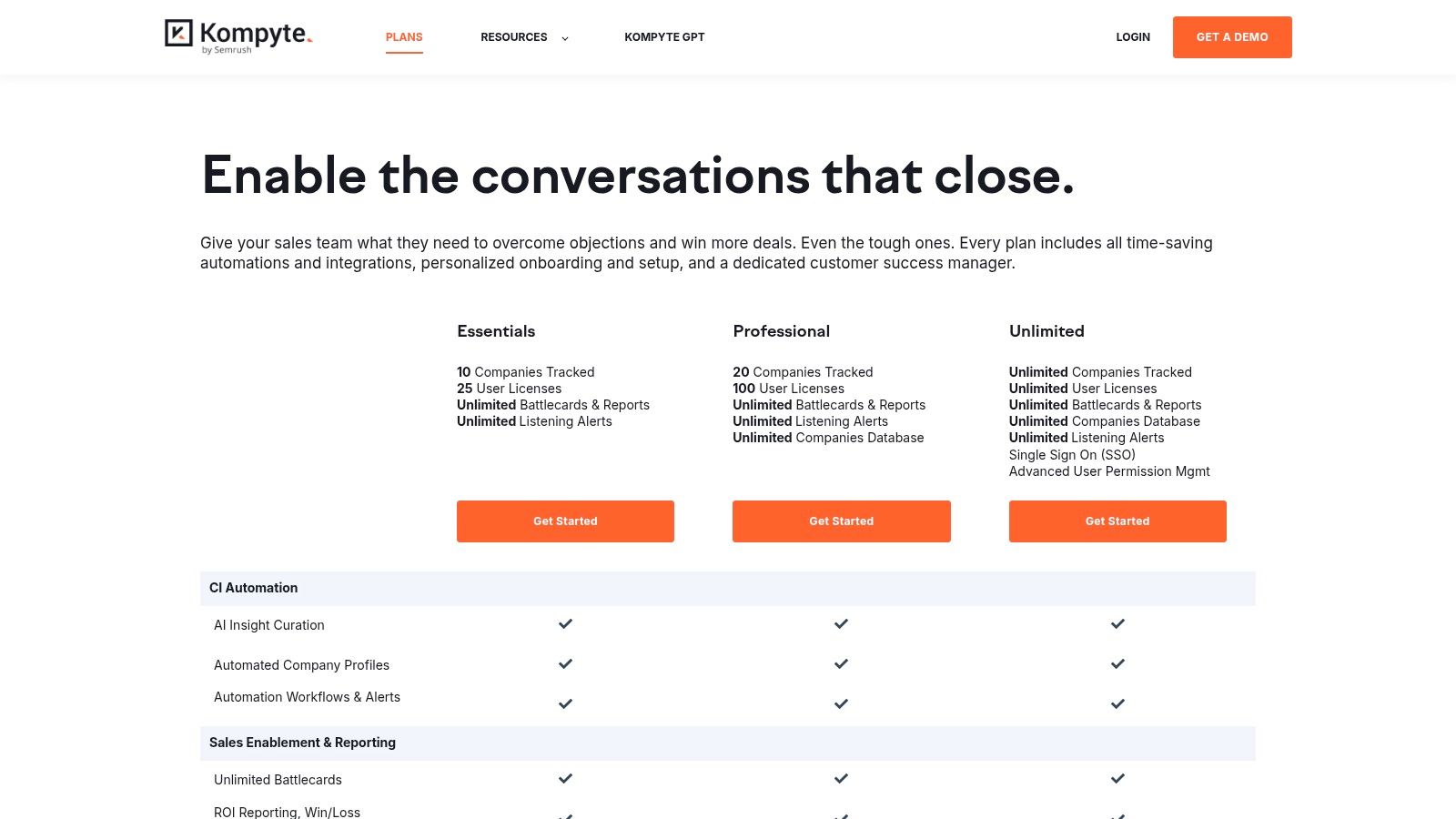
What makes Kompyte one of the best competitor analysis tools for sales-led companies is its direct impact on revenue. We use its Slack integration to push real-time alerts on competitor pricing page updates to our sales channel. This ensures our team can immediately handle pricing objections with current info.
Core Features & How We Use It
- Automated Competitor Tracking: Monitors competitor websites, social media, and feature releases.
- AI-Curated Insights: Delivers filtered intelligence digests to highlight critical updates.
- Sales Battlecards: Creates dynamic battlecards that integrate into a rep's workflow in Salesforce.
- Win/Loss Analysis: Gathers field intelligence from your CRM to analyze why you’re winning or losing.
Our Take: If your main goal is to help your sales team win, Kompyte is a top-tier choice. It provides a clear ROI by showing which battlecards are actually being used and how they correlate with win rates.
Pricing
| Plan | Price (Monthly) | Best For |
|---|---|---|
| Essentials | Custom Quote | Teams needing core automated tracking and alerts |
| Professional | Custom Quote | Businesses focused on creating sales battlecards |
| Unlimited | Custom Quote | Large enterprises requiring win/loss and ROI analytics |
- Pros: Fast implementation, excellent sales enablement features, strong ROI and adoption reporting.
- Cons: Pricing is not public and requires a demo, heavier focus on sales intelligence over deep SEO/marketing data.
Website: https://www.kompyte.com/plans?utm_source=openai
10. Owler
Owler shifts focus from marketing metrics to corporate intelligence. It tracks company events like funding rounds, new hires, and acquisitions. For strategic planning, it’s one of the best competitor analysis tools for understanding the "why" behind a competitor's moves.
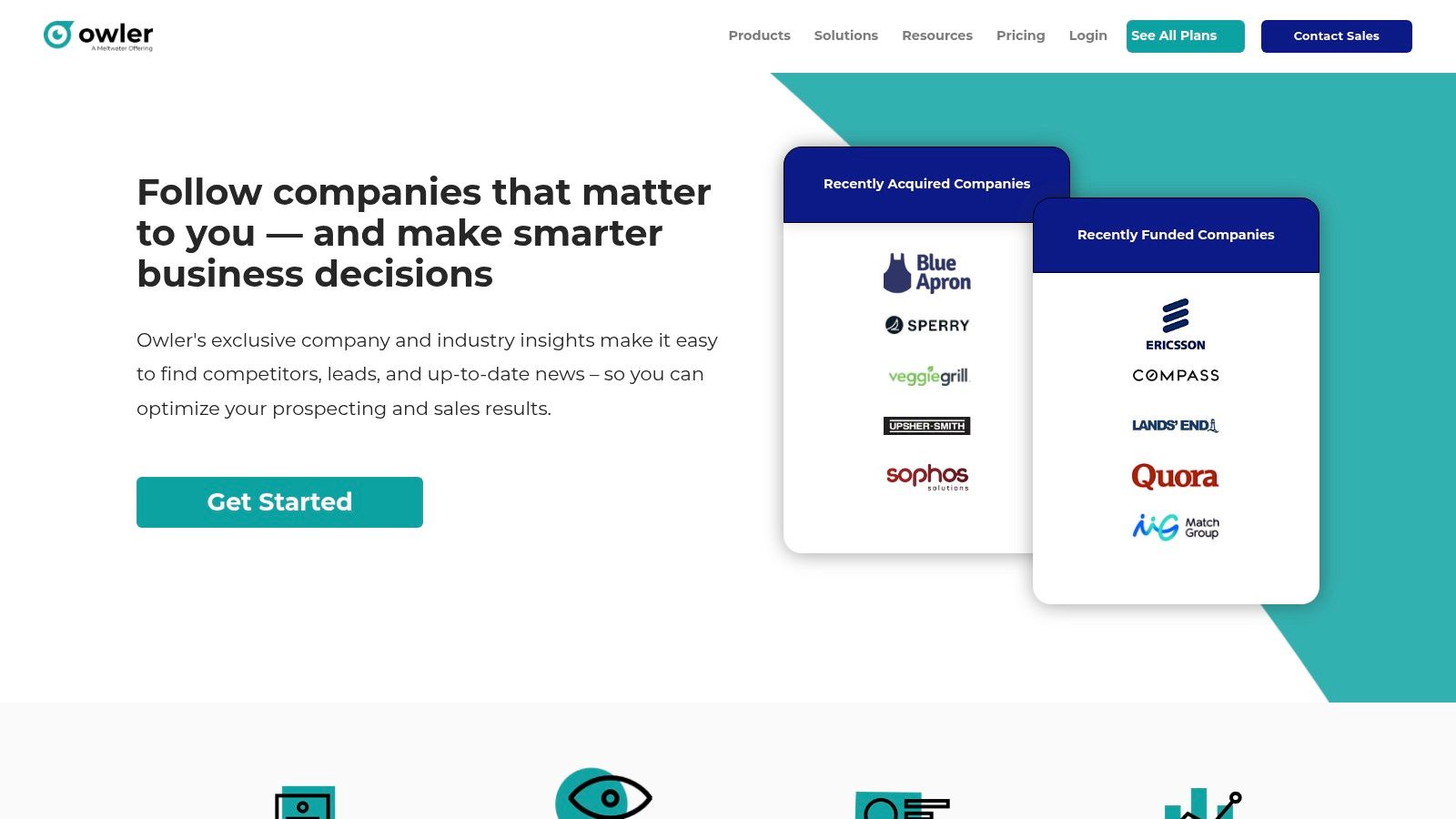
Our BD team uses Owler to set up alerts for our top five competitors. An alert about a new C-suite hire often signals a strategic shift long before it shows up in traffic data. This platform is less about dissecting the past and more about anticipating the future.
Core Features & How We Use It
- Real-Time News Alerts: Get instant notifications on over 20 event types for companies you follow.
- Company Profiles: Access curated profiles with revenue, employee counts, and top competitors.
- Custom Feeds: Build personalized news feeds that deliver only the intel that matters.
- Integrations: Connect Owler with your CRM or Slack.
Our Take: Owler is a powerful complement to an SEO tool. It provides the business context that digital metrics can't. It won't tell you which keywords your competitors are targeting, but it might tell you why they just changed their entire ad budget.
Pricing
| Plan | Price (Monthly) | Best For |
|---|---|---|
| Community | Free | Individuals tracking a few competitors |
| Pro | $49 | Sales and marketing pros needing real-time alerts |
| Max | Contact Sales | Enterprise teams needing CRM integration & API |
- Pros: Excellent for tracking corporate events and strategic shifts, affordable entry-level plan, easy-to-use interface.
- Cons: Not a marketing or SEO analysis tool, data depth can be limited for smaller private companies.
Website: https://owler.com
11. Klue
Klue turns competitive analysis into a revenue-enabling machine. It's designed to collect, curate, and distribute intelligence to sales, customer success, and product teams. Klue’s strength is centralizing scattered intel—from Slack messages to news alerts—into actionable assets like sales battlecards.
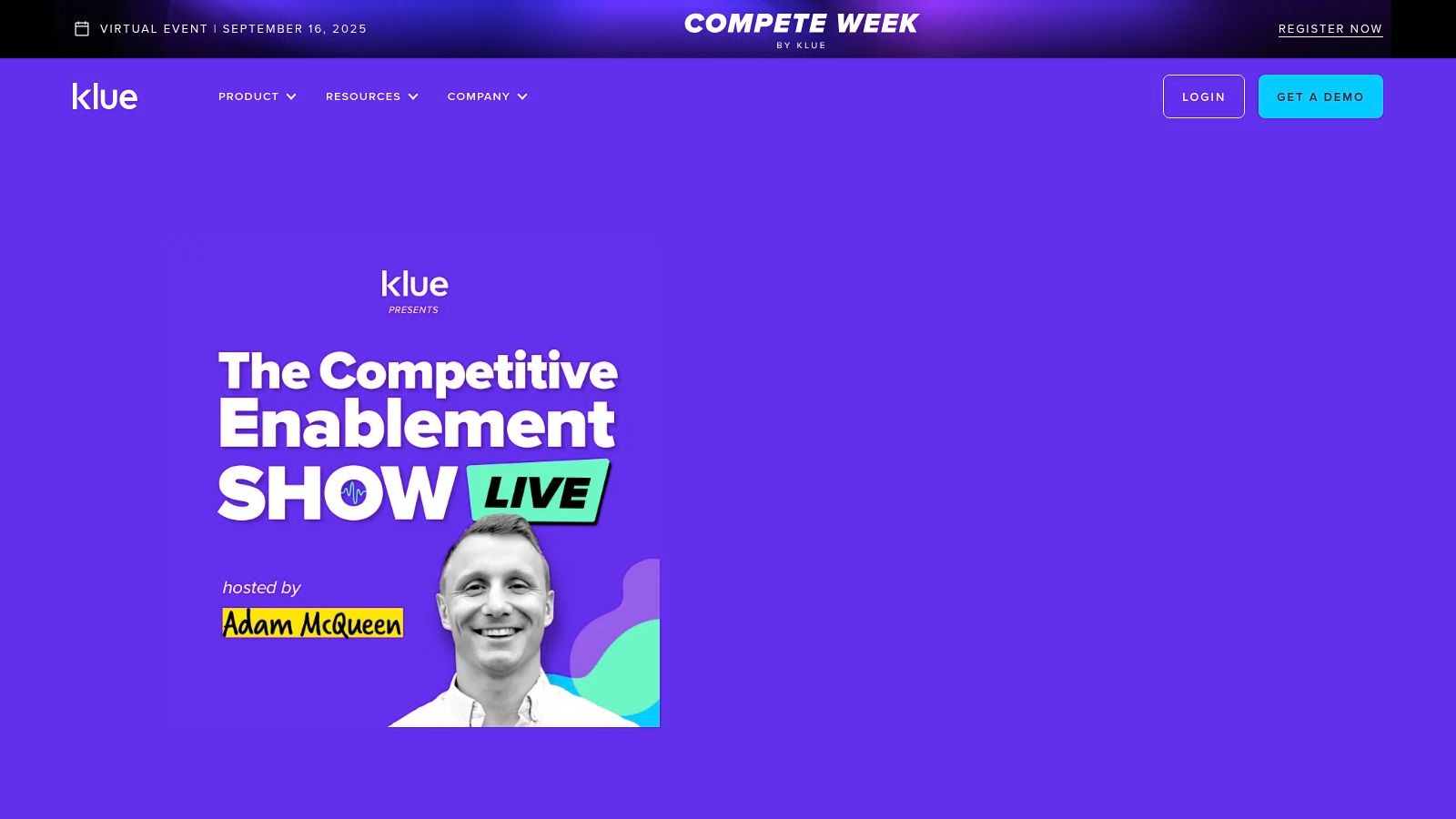
Unlike many marketing tools, Klue is built to arm revenue teams for live deals. The idea is to feed findings from sales calls directly into Klue, which then updates our battlecards on how a competitor is repositioning their value prop. This closes the loop between market intel and frontline execution.
Core Features & How We Use It
- Automated Intelligence Collection: Aggregates data from public sources and internal channels.
- Dynamic Battlecards: Creates and maintains live competitive comparisons for sales teams.
- Win-Loss Program Management: Systematizes collecting and analyzing feedback from deals.
- Revenue Impact Reporting: Connects competitive enablement directly to sales performance.
Our Take: Klue is an investment in process, not just data. It excels at turning raw intel into a tangible sales advantage. It's one of the best competitor analysis tools for mature sales organizations that want to operationalize intelligence at scale.
Pricing
| Plan | Price (Monthly) | Best For |
|---|---|---|
| Custom | Varies | Mid-market to enterprise companies |
| Custom | Varies | Organizations with dedicated sales enablement teams |
| Custom | Varies | Businesses looking to scale competitive programs |
- Pros: Strong sales enablement focus, centralizes disparate intel effectively, provides clear ROI metrics for competitive efforts.
- Cons: No public pricing requires a demo, success is highly dependent on strong internal adoption and process.
Website: https://klue.com/celive?utm_source=openai
12. G2
G2 isn't a competitor analysis tool itself, but it's an indispensable starting point. It's a B2B software marketplace where you can compare tools based on verified user reviews. This meta-research saves hours of demos and trials.
At BillyBuzz, G2 is our first stop when re-evaluating our stack. We use the G2 Grid for Competitive Intelligence to identify top-rated platforms and then filter by company size to see what similar-stage startups are using. This helps us build a relevant shortlist of the best competitor analysis tools to trial.
Core Features & How We Use It
- Verified Reviews: Read in-depth reviews from real users.
- Comparison Grids: Visually compare tools based on user satisfaction and market presence.
- Category Filtering: Narrow down options by features, company size, or industry.
- Alternative Recommendations: Discover lesser-known but highly-rated alternatives.
Our Take: G2 cuts through the marketing hype. It gives you a clear picture of how a tool performs day-to-day. Use it as the first step in your buying journey to create a data-backed shortlist before committing to demos.
Pricing
| Plan | Price (Monthly) | Best For |
|---|---|---|
| User Access | Free | Researching and comparing software solutions |
| Vendor Profiles | Varies | Software companies looking to be listed |
- Pros: Free to use for research, access to a massive database of verified user reviews, powerful comparison features.
- Cons: Sponsored placements can influence visibility, review quality can be inconsistent, pricing info is often a snapshot and needs verification.
Website: https://www.g2.com/categories/competitive-intelligence?utm_source=openai
Top 12 Competitor Analysis Tools Comparison
| Tool | Core Features | User Experience / Quality | Value Proposition | Target Audience | Price Points & Plans |
|---|---|---|---|---|---|
| BillyBuzz | AI-powered Reddit monitoring, context-aware alerts, competitor tracking | Real-time alerts via Email, Slack, Discord; AI relevancy scoring | Saves time, uncovers hidden Reddit leads, boosts SEO value | Startups, growing teams, founders | Starter $15/mo (annual), scalable tiers |
| Semrush | SEO, PPC, content, competitor research tools | Comprehensive, large data coverage | All-in-one competitive & SEO research suite | SEO professionals, marketers | Multiple plans, add-ons increase cost |
| Ahrefs | Backlink index, keyword & competitor analysis | High data quality, powerful workflow | Industry-leading backlink & keyword research | SEO teams, agencies | Tiered plans, add-ons for advanced use |
| Similarweb | Traffic sources, keyword & ads intelligence | Strong top-of-funnel insights | Market & channel benchmarking | Marketing analysts, execs | Tiered, scales with features & users |
| SpyFu | PPC/SEO competitor intelligence, historic ad data | Straightforward UI, unlimited search on Pro | Affordable PPC/SEO competitor insights | PPC specialists, SMBs | Value pricing, Pro highest tier |
| Moz Pro | Keyword/link explorer, site audits | User-friendly, educational resources | Good for SMBs with limited competitor needs | SMB teams, beginners | Multiple plans with seat limits |
| BuzzSumo | Content & PR monitoring, backlink analysis | Strong PR workflows, content benchmarking | Excels in competitor content & influencer insights | PR pros, marketers | Higher pricing, no entry-level tier |
| Crayon | Full-funnel competitive intel, dashboards | Enterprise scalable, team collaboration | Supports broad teams with alerts & workflows | Enterprises, sales/product teams | Custom pricing, requires sales contact |
| Kompyte | Automated competitor tracking, sales battlecards | Fast setup, sales-focused analytics | Designed for sales enablement & ROI | Sales teams, organizations | Custom pricing, annual typical |
| Owler | Competitor news, alerts, profiles | Affordable, useful for quick event tracking | Business development & executive news monitoring | Execs, BD professionals | Pro tier affordable |
| Klue | Win-loss analytics, battlecards, revenue impact | Sales enablement focus, strong internal use | Centralized revenue team competitive intelligence | Revenue teams, sales/product | Custom pricing, demo required |
| G2 | Tool rankings, verified reviews, pricing snapshots | User feedback driven, free research tool | Eases selecting competitive intelligence tools | Buyers/researchers | Free to use |
Building Your Competitor Analysis Engine
Picking competitor analysis tools is like building an engine. You have powerful parts—Semrush for SEO, Klue for sales intel—but the magic is in how you connect them to work for your business. This guide laid out the parts; now you're the engineer.
There is no single "best" tool. There's only the best stack for your stage and goals. A solo founder can get 80% of what they need with a focused tool like BillyBuzz for social listening and the free version of Similarweb. A growing marketing team needs the raw power of Ahrefs or Semrush to dominate SERPs.
From Tools to Strategy: Making Your Choice
Choosing the right tool is about aligning its strength with your most critical business questions. Focus on the job to be done.
- Job: Dominate SEO and content. Your first stop is Semrush, Ahrefs, or SpyFu. These are the heavyweights for keyword gap analysis and backlink auditing.
- Job: Win on product and market positioning. You need Crayon, Klue, or Kompyte. They arm sales and product teams with intel on feature launches, pricing changes, and messaging shifts.
- Job: Tap into the authentic customer voice. This is our world at BillyBuzz. We set up alerts for competitor mentions on Reddit to catch customer pain points and feature requests as they happen. This is unfiltered, real-time feedback.
A common mistake is buying a powerful tool without a plan. The best competitor analysis tools only work if they’re part of a process. Don't just collect data; turn it into a strategic advantage. For building your own systematic approach, exploring a competitive analysis framework can provide invaluable guidance.
A Founder’s Final Word: Activate Your Insights
The goal isn't to know what your competitors are doing; it’s to outmaneuver them. These tools are your radar. They provide the intel, but the winning moves come from your team's ability to interpret that data and act on it fast.
Start small. Pick one area to improve—your SEO rankings, your sales win rate, your social engagement. Choose one tool from this list that solves that problem. Use it daily for a month and measure the results. Build your competitor analysis engine one piece at a time, and you'll turn data from a report into a growth-driving force.
Ready to stop guessing what customers are saying about your competitors? BillyBuzz was built for founders and teams who need real-time, unfiltered insights from the social web. Instead of drowning in data, get alerts on the conversations that matter, so you can build better products and smarter marketing campaigns. Try BillyBuzz and start listening to your market today.
